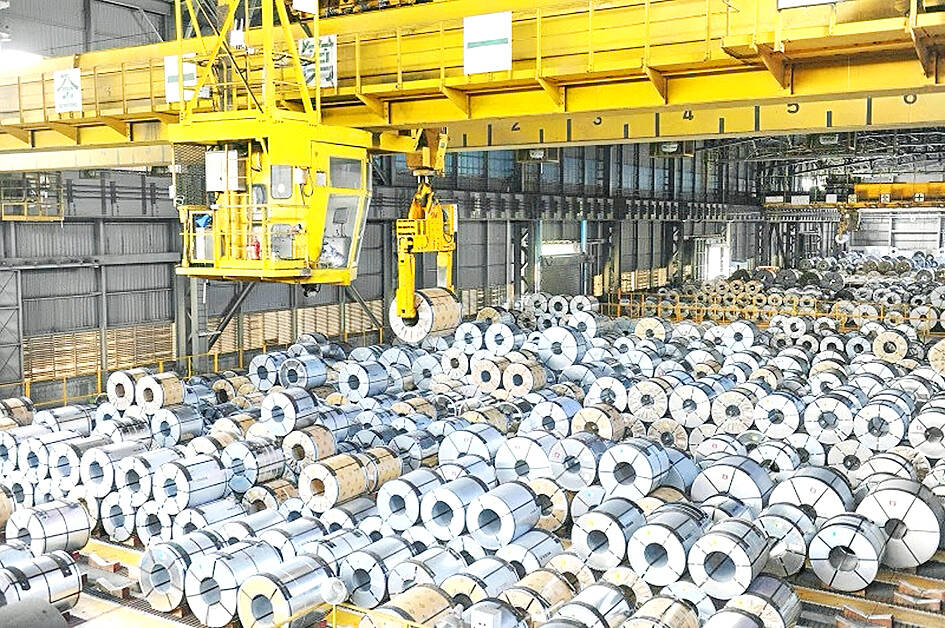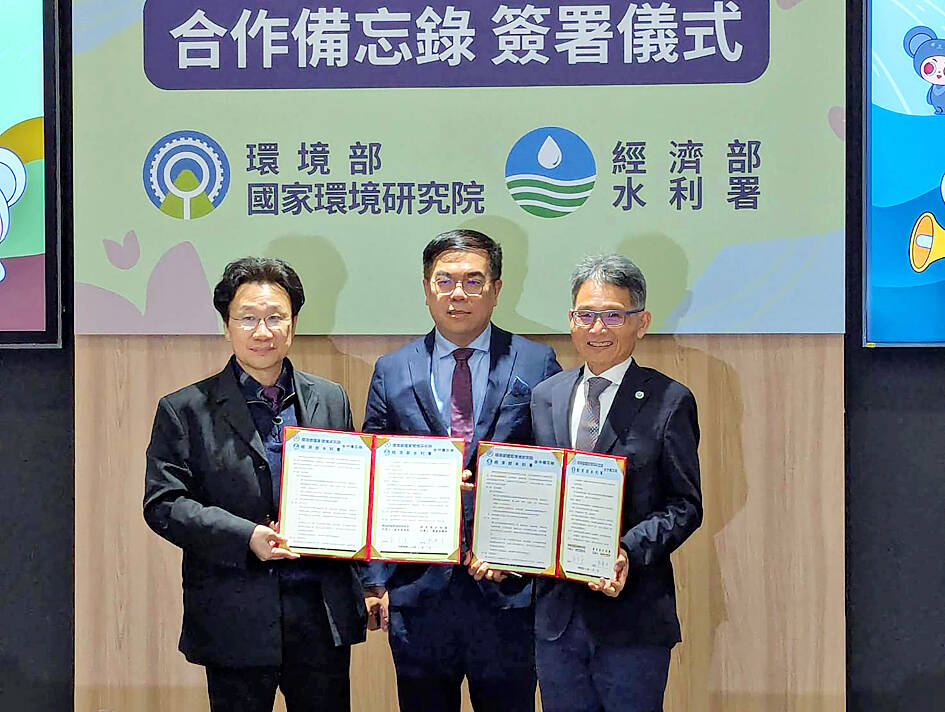A bill to establish Taiwan’s carbon border adjustment mechanism (CBAM) would be formulated in the second half of this year at the earliest, Minister of Environment Peng Chi-ming (彭啟明) said yesterday as new carbon tariffs are to be imposed under the EU’s CBAM next year.
The EU has said that mandatory carbon tariffs would be applied to carbon-intensive products imported into its territory, such as steel, cement and aluminum, with official guidelines to be issued by July or August.
Peng said he has taken up the EU’s invitation to become one of its international CBAM consultants and would continue to observe the latest developments.

Photo courtesy of China Steel Corp
Taiwan’s CBAM could be proposed in the second half of this year at the earliest in line with the EU’s official documents upon their release, he said.
Given that US President Donald Trump is introducing new tariff policies targeting different importing countries, how the EU’s CBAM responds to US tariff schemes remains uncertain, Peng said.
As CBAM is a complicated trade process that is regulated by the WTO, Taiwan would have to apply to the WTO for approval for its own version, he said.

Photo: Chen Chia-yi, Taipei Times
Domestic steel and cement manufacturers have complained to the Ministry of Environment that major competing importers are not required to disclose their carbon emissions, Peng said, adding that the ministry is compiling a list of importers — most of which are steel or cement manufacturers — to be regulated along with agencies in charge of international trade and customs affairs.
In line with the carbon fees implemented for domestic manufacturers from this year, the ministry would next set up a scheme requiring importers to disclose carbon footprints and emissions based on the EU’s regulations, he said.
For example, Taiwan imports about one-third of its cement from Vietnam, which would definitely be subject to CBAM regulations, he said.
Such measures must be introduced to protect domestic manufacturers, he said.
Meanwhile, the National Environmental Research Academy and the Water Resources Agency yesterday announced plans to make the Tamsui River (淡水河) clean enough to swim in.
“The goal is for people to swim in the river someday, just like the Seine in Paris,” Peng said at an event marking a signing of a memorandum of understanding on the “Transparent Tamsui River” imitative.
In the next few months, the project is to launch an online platform to help the public learn about the pollution status of the river, he said.
The Tamsui River is Taiwan’s most iconic river, and has been allocated the most money for cleaning and rehabilitation, he said.
Monitoring stations along the river can help identify pollution sources and help officials take necessary steps to reduce it, Water Resources Agency Director-General Lai Chien-hsin (賴建信) said.
Climate change affects seawater and the amount of water flowing through the Tamsui River to the sea, Lai said.
Starting this year, the agencies are to launch a new study on the effects of climate change on water volume and how heavily polluted water plays a role in these dynamics, he said.
Proactive water management is necessary as climate change has caused severe changes in water systems, National Environmental Research Academy Director Liu Tsung-yung (劉宗勇) said.
Through scientific research, these efforts can be bolstered, such as through cooperation between the National Environmental Research Academy and the Water Resources Agency on climate change, pollution prevention and water planning, he said.
Additional reporting by CNA

Taiwan is stepping up plans to create self-sufficient supply chains for combat drones and increase foreign orders from the US to counter China’s numerical superiority, a defense official said on Saturday. Commenting on condition of anonymity, the official said the nation’s armed forces are in agreement with US Admiral Samuel Paparo’s assessment that Taiwan’s military must be prepared to turn the nation’s waters into a “hellscape” for the Chinese People’s Liberation Army (PLA). Paparo, the commander of the US Indo-Pacific Command, reiterated the concept during a Congressional hearing in Washington on Wednesday. He first coined the term in a security conference last

Prosecutors today declined to say who was questioned regarding alleged forgery on petitions to recall Democratic Progressive Party (DPP) legislators, after Chinese-language media earlier reported that members of the Chinese Nationalist Party (KMT) Youth League were brought in for questioning. The Ministry of Justice Investigation Bureau confirmed that two people had been questioned, but did not disclose any further information about the ongoing investigation. KMT Youth League members Lee Hsiao-liang (李孝亮) and Liu Szu-yin (劉思吟) — who are leading the effort to recall DPP caucus chief executive Rosalia Wu (吳思瑤) and Legislator Wu Pei-yi (吳沛憶) — both posted on Facebook saying: “I

Sung Chien-liang (宋建樑), who led efforts to recall Democratic Progressive Party (DPP) Legislator Lee Kun-cheng (李坤城), was released on bail of NT$80,000 today amid outcry over his decision to wear a Nazi armband to questioning the night before. Sung arrived at the New Taipei District Prosecutors’ Office for questioning in a recall petition forgery case last night wearing a red armband bearing a swastika, carrying a copy of Adolf Hitler’s Mein Kampf and giving a Nazi salute. Sung left the building at 1:15am without the armband and covering the book with his coat. Lee said today that this is a serious

Firefighters are working to put out a fire on Taipei’s Yangmingshan (陽明山) reported earlier this morning. The cause of the fire is still under investigation. The Taipei Fire Department said it received a report of a fire at Xiaoyoukeng (小油坑) at 11:17am, dispatching four command vehicles, 16 firetrucks, one ambulance and 72 personnel. The fire is still burning on about 250m² of land, according to initial estimates, as eyewitnesses reported seeing smoke rising from the mountain. The Yangmingshan National Park Headquarters on Facebook said the Qixingshan (七星山) hiking trail starting from Xiaoyoukeng and the Xiaoyoukeng parking lot are closed as firefighters work to put